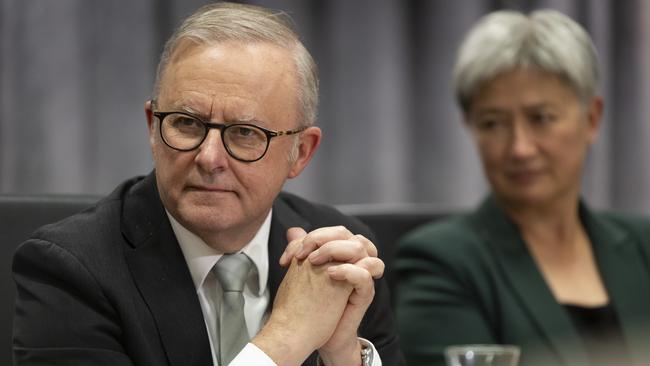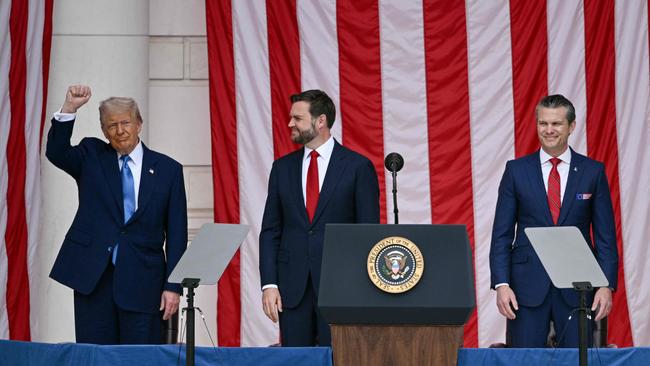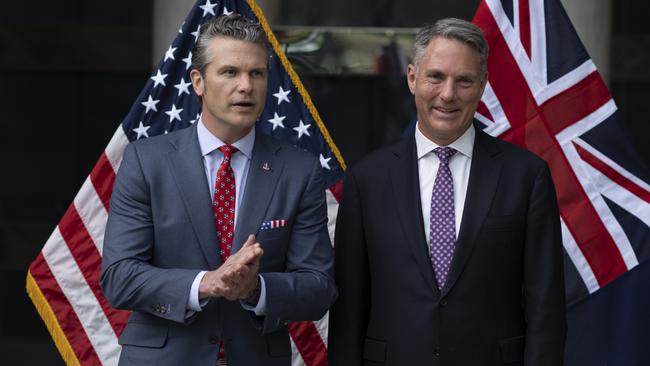PM makes two big bets on nation’s defence

Anthony Albanese is gambling Australia’s future defence and security on two fronts and he may lose on both.
First, the Prime Minister is betting he can convince US President Donald Trump and Trump’s Defence Secretary, Pete Hegseth, to accept the government’s minimalist plan for defence spending during the coming decade without doing serious damage to the US-Australia alliance.
Second, Albanese is gambling that, despite numerous official and external warnings, Australia will not need to fight a major war in the Indo-Pacific in the next 10 years.
Both bets are very risky: if Albanese loses one or both, Australia’s security will be severely damaged, possibly irretrievably.
Washington’s pressure on Australia and other Indo-Pacific allies to increase defence spending is strong and unwavering. It has several powerful drivers.
Most important is the challenge of Beijing’s surging military power, its extensive preparations to fight a major war, and its aggressive behaviour towards Taiwan, Japan, The Philippines and other regional democracies.
Another driver is the rapid rise of Beijing’s military-industrial strength, with China’s manufacturing output now double that of the US.

A further US concern is the prospect of having to confront a rapidly growing Chinese nuclear force and the possibility of a Chinese-Russian nuclear coalition that could deploy more than double the number of US nuclear weapons by 2035.
That risk is driving preparations for a rapid expansion and modernisation of the US nuclear arsenal. It also has spurred Trump to announce the urgent deployment of the Golden Dome system, to provide ballistic and cruise missile defence for the American homeland. This is expected to cost about $US175bn ($270bn).
The Trump administration is determined to reverse the erosion of its nuclear escalation dominance. Australia and all other allies should support this endeavour because it will enhance our deterrence power and limit our vulnerability to nuclear coercion.
In the face of these urgent demands, the Trump administration has set clear security priorities and determined that the US cannot do all of the heavy lifting. The allies must make much stronger contributions to their own and to collective defence.
In his address to the Shangri-La Dialogue, Hegseth made clear the Trump administration’s priority defence policy region is Asia.
In consequence, the European allies have been pressed to take much of the defence load in their region and accept the lead in underpinning the defence of Ukraine. Nearly all of the European allies have now agreed to substantially boost their defence spending.
Poland expects to spend 4.7 per cent of its GDP on defence this year. Lithuania plans to spend 5.5 per cent and Estonia 5.4 per cent next year, and Germany is hiking its defence budget by 75 per cent immediately, to 3.5 per cent of GDP. There are also reports Germany is planning a further rise, to 5 per cent, before the end of the decade.
In his speech, Hegseth contrasted the efforts of some Asian allies with the substantial spending commitments already made by America’s NATO partners when Europe faces a less formidable threat.
This is the context for Hegseth asking Defence Minister Richard Marles to lift Australian defence spending from its current 2 per cent of GDP to 3.5 per cent “as soon as possible”. During his plenary presentation, Hegseth appeared to be looking straight at Marles when he stated that, in the case of some allies, “tough love” was needed.
Albanese’s response so far has been to stick with the government’s plan to lift defence spending from its current 2 per cent of GDP to 2.33 per cent in eight years. “What we’ll do is we’ll determine our defence policy. And we’ve invested across the forwards, an additional $10bn in defence,” he said.

If the government fails to move on its business-as-usual, minimal-growth approach, the Prime Minister can expect a frosty reception from Trump if their anticipated meeting takes place on the margins of the G7 summit in Canada in 10 days. If Albanese is eventually invited to the Oval Office, a Zelensky-like dressing-down may be in store.
Australia’s alliance with the US is unlikely to be unscathed.
The second big security gamble made by Albanese and his colleagues is that Australia will not need to fight a major war in the coming decade. Indeed, it appears the government doesn’t even see a need to take additional steps to deter such a war occurring.
These judgments fly in the face of numerous official and unofficial assessments that the risk of China conducting a major operation to seize democratic Taiwan is high and, if it occurs, it is likely to trigger a major war between China and the US and its allies.
Hegseth reminded his audience that President Xi Jinping has ordered China’s military to be ready to conduct a major assault on Taiwan by 2027.
“There is no reason to sugar-coat it. The threat China poses is real and it could be imminent,” Hegseth said.
Albanese appears not to have come to terms with the shift of global power and potential conflict to East Asia during recent decades. In the event of such a crisis, Australia will be close to the primary battlefields and would likely be attacked at an early stage. Recent intense discussions in Washington and other allied capitals have confirmed that if war breaks out we should expect missile strikes, attacks on key defence bases and shipping, mining of some ports, special forces raids, sabotage and powerful disabling cyber attacks.
The government appears unconcerned that our military and our civilian population are grossly unprepared.

Regrettably, Australia’s strategic situation is even worse than this. America’s military and defence industrial capabilities have been allowed to run down so far that in the event of a major crisis, the US will struggle just to supply its own forces.
US polling also reveals public support for the commitment of American forces for the defence of allies and partners is weakening. Since the Vietnam War, the experience is that, even if a president commits forces at the outset of a crisis, the American public is unwilling to sustain major military operations abroad taking casualties for an extended period unless the US itself is directly threatened.
A further serious complication is that, during the past two years, Joe Biden and Trump have interfered in the campaigns of self-defence being fought by Ukraine and Israel.
Under both presidents the US has insisted allies accept US directions, even if this has meant handing over national territory to an authoritarian invader or surrendering core interests to a terrorist group. The lessons for Australia are stark. In contrast to the past, prompt, powerful, sustained and fully co-operative US support for Australia in a future crisis is now much less predictable and less likely.
The brutal truth is, in some circumstances we may need to fight to defend ourselves largely on our own.
In years past Australian politicians routinely stated the highest priority of the government is to protect the nation and its people. Albanese and his colleagues appear to have a different view. They have placed two very risky bets. The stakes for our future independence and freedom could scarcely be higher.
Ross Babbage is chief executive of Strategic Forum in Australia and a non-resident senior fellow at the Centre for Strategic and Budgetary Assessments in Washington





